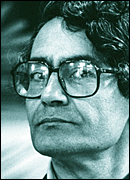

![]()
Gathering Places


![]()
Gathering Places
Sept. 11, 2001 may be considered a defining moment in world history. For a decade, pundits have been groping for a new catch phrase to identify the main features of the post-Cold War era. "End of History," "Clash of Civilizations," and "Globalization" have been obvious candidates. These terms catch an aspect of the phenomenon, but distort others. Search for a measured
response to global terrorismNone fits the new reality of a global war of terrorism and counter-terrorism that seems to lie ahead of the world. There is no catch phrase to grasp the tragedy and complexity of this new reality. Since both state and non-state actors are acting with willful planning, we may call our troubled times, "The Era of Death by Design."
There is also no panacea for the crisis. The problem seems to have three linked features. First, we have witnessed mounting terrorist acts in the past 40 years carried out both by state and non-state actors. Second, we are witnessing the rise of a new global system characterized by growing gaps among and within nations. Third, we live in a global fishbowl in which Hollywood extravaganzas as well as starving children in Africa are displayed for all to see on their television screens. The envy and hatred generated by global communication seems to have outpaced the benefits.
In the past decade, Western powers have demonstrated that they can destroy their adversaries in Iraq and Yugoslavia with high-tech weapons without much damage to themselves. Terrorism has consequently become the weapon of choice by the weaker states and groups. The suicide attacks in New York, Washington and Israel are part of that lesson. The "enemy" is not a territorial state. It is the fringe elements of a much larger global resentment against the way the world is being run. We have entered into a new form of politics and warfare.
Against the commodity of fetishism of globalization, identity fetishism has become the ideological vehicle of the marginalized groups. Benjamin Barber has called it "Jihad vs. McWorld." Against the market fundamentalism of neo-liberalism, religious and ethnic fundamentalism is the new battle cry.
Against post-modern cosmopolitanism of the centers, pre-modern kinship and tribal loyalties are the cultural orientation of the peripheries. Since the advanced industrial world is powerful but highly vulnerable to sabotage and surprise, the new weapon of shock terrorism is deadly and effective. In future, it may include other weapons of mass destruction. The types of weapons that could possibly be deployed by terrorists in the future are too horrible to contemplate.
The response to terrorism cannot be divorced from its underlying causes.
Both problems are global in scope. The approach must be commensurately global. Despite its shortcomings, the United Nations system continues to provide us with a useful institution under which a carefully devised strategy of war on violence and poverty can be fought. The United Nations counter-terrorism and peacekeeping forces must be reinforced. We need a standing U.N. peacekeeping force that is fully equipped with counter-terrorist intelligence and the necessary means to prevent tragedies such as that of Sept. 11.
That is necessary but not sufficient. The world community under the U.N. auspices must demonstrate that it cares for the fate of some 2 million people in the world today living on $2 a day. U.N. member-states should commit themselves to a war on world poverty and injustice by tangible means.
A certain portion of national defense budgets, say 10 percent, should be allocated to the United Nations peacekeeping and poverty eradication programs. The world cannot afford to continue living one-fifth rich, two-fifths in abject poverty, and another two-fifths struggling for a decent living.
As Huxley has said, "civilization is a race between education and catastrophe." We often learn through our pains and sufferings. Historical leaps often result from major human tragedies. The League of Nations resulted from World War I. The United Nations emerged out of World War II.
This time, global terrorism has proved to be a scourge of humanity. Its victims have paid a high price. For their blood not to be in vain, we must learn to come together. We must establish a more democratic and just global governance. We must pledge to a new rule of international law for nations large or small.
Majid Tehranian is the director of the
Toda Institute for Global Peace and Policy
Research at the University of Hawaii-Manoa.